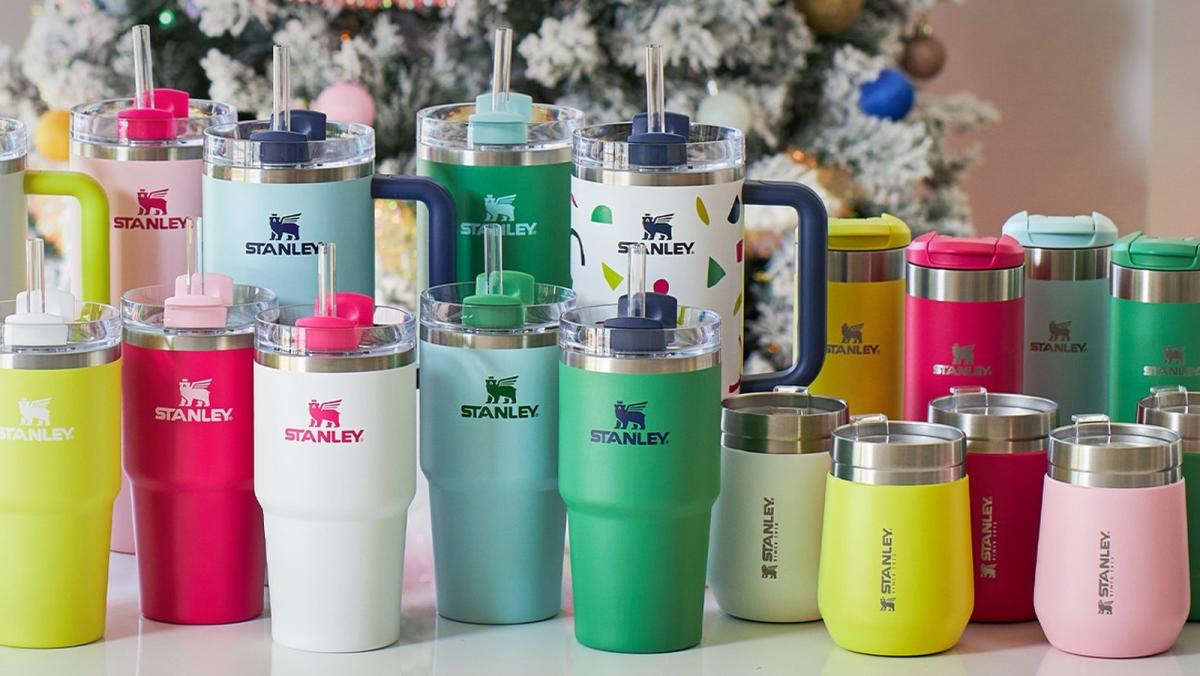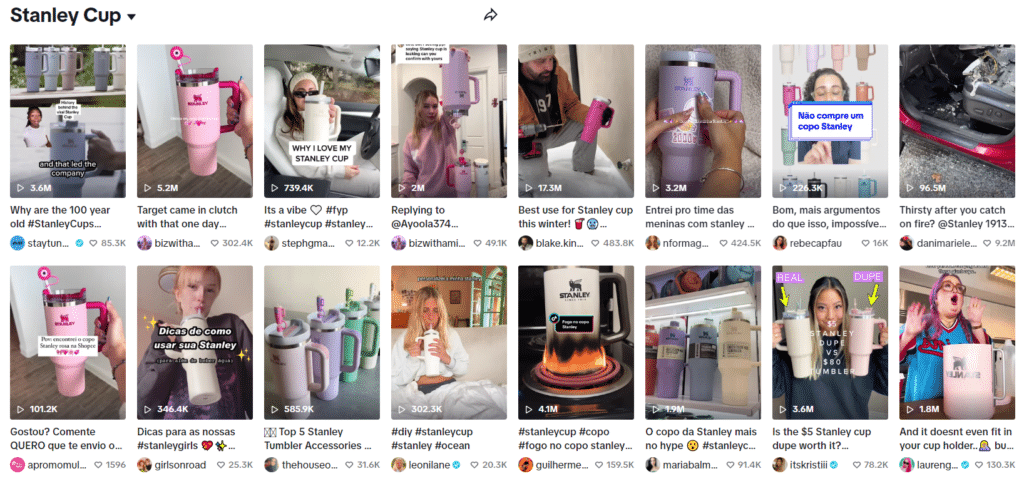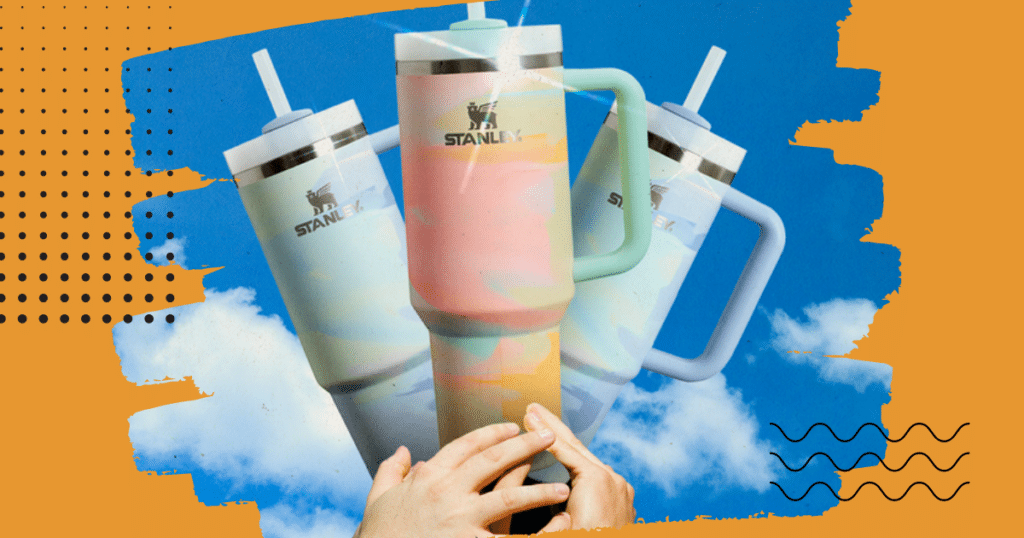Have you ever wondered why those humble Stanley cups, initially designed for practical use, have become the hottest trend in recent years? Additionally, in this insightful journey through the Stanley phenomenon, we dive deep into the reasons behind their skyrocketing popularity.
From marketing strategies that hit the bullseye to the psychology of consumer behavior, discover why Stanley cups have become more than just containers – they’re a symbol of lifestyle, aspiration, and social status.
Few tales are as compelling as the Stanley Cup’s rise to viral fame. But we’re not talking hockey here; we’re diving into the world of hydration and how Stanley’s Quencher Tumbler became a cultural phenomenon. So, grab your favorite drink (preferably from a Stanley Cup), and let’s unravel this mystery.
- The Evolution of Stanley Cups: From Utility to Iconic Lifestyle Accessories
- TikTok’s Influence and The Quencher Revolution: Stanley Cups Making Waves
- Riding the Viral Wave: Stanley’s Content Mastery
- FOMO Marketing Mastery: The Urgency in Every Sip of Stanley Cups
- Leveraging User-Generated Content: The Real MVPs
- Collaborations that Resonate
- The Art of Community Building
- Conclusion: A Marketing Odyssey with Stanley
The Evolution of Stanley Cups: From Utility to Iconic Lifestyle Accessories
Stanley cups, born in 1913 as humble companions for outdoor activities, have undergone a dramatic transformation. Imagine going from construction sites to the sleek coffee tables of trendsetters. It’s a journey of evolution that makes Darwin’s theories proud.
At first glance, a cup is just a cup. But the Stanley Cup? That’s where the ordinary ends. The question “why are Stanley cups so popular?” goes beyond mere aesthetics. Stanley tapped into a concoction of quality, nostalgia, and social media savviness that turned a simple beverage container into a must-have accessory. Their secret sauce? A blend of heritage brand appeal with a keen eye for modern consumers’ desires.
In marketing, adaptability is more than a skill – it’s the game-changer. Stanley cups have not just adapted; they’ve mastered this art over a century, becoming an evergreen symbol of versatility.
In the last four years, Stanley has unleashed a spectrum of over 100 colors; turning what used to be a utilitarian item into a fashion statement. Marketing lesson here? Color speaks louder than words.

Colors aren’t merely hues; they’re conduits of emotions, expressions, and individuality. In this chromatic revolution, Stanley not only understood but embodied the essence of each shade. Now, everyone yearns for a Stanley cup for every mood, every moment – a true testament to the brand’s mastery of the art of visual storytelling.
The Color Craze: A Stroke of Genius
Let’s talk about the color strategy. Stanley didn’t just launch a product; they launched a palette that perfectly tapped into contemporary trends. By regularly releasing new, limited-edition colors, they created a frenzy of excitement and anticipation. This clever tactic not only fueled ongoing interest but also established the cups as collectible items, thereby further boosting their popularity.
In a world where trends change as fast as TikTok challenges, Stanley has managed to stay relevant across generations. The endowment effect, where the longer you use something, the more valuable it becomes, is a psychological sweet spot.
Being trendy is good; being timeless is better. Stanley cups have found the equilibrium.
TikTok’s Influence and The Quencher Revolution: Stanley Cups Making Waves
In an era where attention spans are as fleeting as a TikTok video, Stanley cups have not only survived but thrived. Amassing over 7 billion views under the hashtag #stanleycup, this phenomenon is more than a testament to TikTok’s influence. It’s a saga of how short videos can orchestrate a cultural renaissance.
The right social media strategy can catapult a brand from obscurity to ubiquity overnight. Stanley’s ascent on platforms like TikTok is a testament to the power of authentic, user-generated content. When influencers and everyday users alike shared their genuine love for the brand, Stanley cups didn’t just become popular; they became a part of people’s identities.
But how does a brand rooted in construction worker utility evolve into a chic accessory for the masses? Enter The Buy Guide and their strategic bet on the Quencher model – a move that sparked a revolution and unveiled a nugget of marketing wisdom: knowing your audience is akin to striking gold.

The Female Market: Unlocking a New Audience
One of Stanley’s pivotal moves was embracing a segment often overlooked by drinkware brands: women. Moreover, by recognizing and catering to women’s preferences, Stanley not only expanded its market but also fostered a community of brand advocates. Consequently, this strategic inclusivity has been key to their widespread popularity.
Sustainability: A Cup for the Conscious Consumer
In an era where eco-friendliness is not just appreciated but expected, Stanley cups shine. Their durable design and brand messaging around sustainability resonate with consumers looking to make responsible choices. This alignment with consumer values has been crucial in building trust and loyalty.
Collaboration is Key: Strategic Partnerships
Stanley’s knack for choosing the right partners to collaborate with has amplified their reach and appeal. Additionally, whether it’s co-branded products or aligning with eco-conscious initiatives, these partnerships have helped Stanley stay relevant and exciting.
Beyond the Cup: Creating a Lifestyle Brand
Stanley’s success is not just about selling cups; it’s about selling a lifestyle. Through clever marketing and consistent brand messaging, they’ve created an ecosystem where owning a Stanley product means belonging to a community. This sense of belonging is what turns customers into lifelong fans.
For marketing professionals, Stanley’s story offers invaluable lessons. Authenticity, strategic audience engagement, leveraging nostalgia, and embracing digital platforms are not just buzzwords but pillars of a successful brand strategy. Stanley demonstrates that understanding your audience and genuinely meeting their needs can turn a simple product into a cultural icon.
Riding the Viral Wave: Stanley’s Content Mastery
Stanley’s understanding of content marketing dynamics played a significant role in its virality. By crafting shareable, engaging content that resonated with their audience’s lifestyles and values, they didn’t just sell products; they created moments. Their strategic use of hashtags, challenges, and partnerships with content creators turned the Stanley cup into a symbol of a vibrant, active lifestyle that many aspired to.
When Gen Z icon Olivia Rodrigo confesses her love for the Stanley cup, you know you’re onto something. The lesson? Influencers can turn a brand into a lifestyle.
Stanley’s understanding of content marketing dynamics played a significant role in its virality. By crafting shareable, engaging content that resonated with their audience’s lifestyles and values, they didn’t just sell products; they created moments. Their strategic use of hashtags, challenges, and partnerships with content creators turned the Stanley cup into a symbol of a vibrant, active lifestyle that many aspired to.
A single Stanley cup now symbolizes a well-hydrated, dynamic, and trend-savvy individual. It’s not just about the beverage; it’s about what your cup says about you. Lesson learned? Your product is not just a product; it’s a narrative.
In the age of social media, your brand is the story you tell. Stanley cups have become storytellers in every user’s hand.
Engaging with Authenticity: Building Trust and Loyalty
Key to Stanley’s popularity is its unwavering commitment to authenticity. In an age where consumers are bombarded with ads and endorsements, Stanley’s approach was refreshingly genuine. They focused on building real relationships with their audience, engaging in conversations, and listening to feedback. This authentic engagement fostered a deep sense of trust and loyalty among consumers, making the brand not just a choice, but a community.
FOMO Marketing Mastery: The Urgency in Every Sip of Stanley Cups
The fear of missing out (FOMO) is not just a psychological tool; it’s Stanley’s secret sauce. Limited editions, collaborations, and sold-out releases create a sense of urgency that marketers dream of.
Stanley cups disappearing from the shelves faster than hotcakes – that’s not magic; that’s FOMO in action.
Exclusivity can be a powerful tool, and Stanley wielded it masterfully. By making certain products or colors available for a limited time, they created a sense of urgency that drove sales and social media buzz. This strategy of scarcity and exclusivity not only made owning a Stanley cup feel like joining an elite club but also further elevated its desirability.
From $75 million to a staggering $750 million in sales in 2023 alone – that’s the Stanley glow-up. The company’s strategic shift, led by Terrence Reilly, showcases the impact of a well-executed brand revamp.
In marketing, reinvention is not an option; it’s a necessity. Stanley’s success story is a testament to this.
Leveraging User-Generated Content: The Real MVPs
Central to Stanley’s viral success was its adept use of user-generated content (UGC). By encouraging and showcasing real customers’ experiences, Stanley cups became more than a product; they became a shared experience. Additionally, this UGC not only provided authentic endorsements but also magnified the brand’s reach exponentially, making every customer a potential ambassador.
Collaborations that Resonate
The collaboration with Starbucks didn’t just create a buzz; it created queues snaking around corners. The lesson for marketers? Collaborations should be more than a merger of logos; they should tell a story that captivates the audience.

A collaboration should feel like a blockbuster movie – eagerly anticipated, thoroughly enjoyed, and leaving the audience wanting more. Stanley nailed it.
Stanley’s century-old legacy is not a relic of the past; it’s a driving force behind their contemporary success. Balancing nostalgia with innovation is a marketing tightrope, and Stanley is walking it gracefully.
Innovation without roots is a tree without branches. Stanley cups have deep roots, and that’s why they can touch the skies.
The Art of Community Building
Beyond being a vessel for beverages, Stanley cups have become a symbol of community. From online forums to local meet-ups, fans of the brand are creating a tight-knit community. Marketers, take note: your product is not just a commodity; it’s a connector.
In the digital age, community is a currency. Stanley cups have become the emblem of a community that sips together and stays together.
Conclusion: A Marketing Odyssey with Stanley
So, why are Stanley cups so popular? It’s not just the stainless steel or the vibrant colors; it’s the brand’s ability to adapt, reinvent, and become a symbol of diverse lifestyles. From their utilitarian origins to becoming a global phenomenon, Stanley’s journey is a narrative of adaptability, innovation, and a deep understanding of the human psyche.
As we’ve seen, the popularity of Stanley cups goes far beyond their functionality. It’s a tale of marketing brilliance, where understanding consumer behavior, leveraging social media, and staying true to brand values can create a viral sensation. So, to all the marketing pros out there, take a leaf out of Stanley’s book: innovate, engage, and always, always listen to your audience. Moreover, in the world of marketing, the best stories are those lived by the customers themselves.
Stanley’s rise is more than a case study; it’s a blueprint for brand immortality in the digital age. By marrying tradition with trendiness, and product quality with perfect storytelling, Stanley has not just sold cups; they’ve crafted a culture. And in this culture, everyone’s invited to the table, cup in hand, ready to make history.
[ion_script src=”https://ionfiles.scribblecdn.net/scripts/ionizer-1.4.2.min.js” hash=”eyJ1cmwiOiIvL2ludGVyYWN0aXZlLnJvY2tjb250ZW50LmNvbS90aGViZWF0LWJhbm5lcj9faW9uX3RhcmdldD1lbWJlZC0xLjAiLCJpZCI6Il9pb25faW9uaXplcl8xNzA2NzE5NDQ4MTI4IiwiZnVsbFNjcmVlbiI6ZmFsc2V9″]







